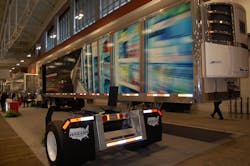Trailer maker Wabash National Corporation and BASF are officially introducing an all-composite 53-ft. refrigerated trailer that’s designed to boost thermal efficiency by 20% yet reduce weight by 15% compared to its aluminum, wood and steel predecessor.
“The growth in cold chain infrastructure and the significant investment being made in home food delivery services presented an emerging market opportunity,” noted Brent Yeagy, Wabash’s group president of commercial trailer product, in a statement. “Our close connection with BASF and their material expertise made this concept trailer possible."
“The global cold chain market is growing in excess of 15% annually,” added Jim Reddy, new market development manager for the performance materials division at BASF. “With fuel economy and environmental forces continuing to grow, it was important that we work together to create a lighter and corrosion-free trailer.”
At the 2016 Technology & Maintenance Council (TMC) annual meeting earlier this month, Robert Lane – Wabash’s director of product and business development – told Fleet Owner that it took about three years to bring this new composite reefer trailer design to market. Initial production should begin later this year, with full scale production to commence in 2018.
Lane noted the composite design helps reduce the trailer’s empty weight by 1,500 to 2,000 lbs., and if that same composite material is used to build the trailer’s floor, the floor weight rating can be raised to 24,000 lbs. versus a typical 16,000 to 18,000 lb. rating – giving the unit more “backhaul flexibility,” he said.
“That makes this refrigerated trailer more versatile so it can operate with dry van-like capacity,” Lane explained.
About the Author
Sean Kilcarr
Editor in Chief
Sean Kilcarr is a former longtime FleetOwner senior editor who wrote for the publication from 2000 to 2018. He served as editor-in-chief from 2017 to 2018.
